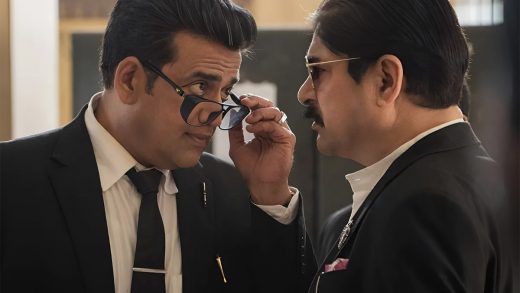:format(webp)/https://www.thestar.com/content/dam/thestar/entertainment/television/2023/06/02/a-fond-farewell-to-a-prestige-tv-show-that-was-a-feminist-fairy-tale-with-really-great-clothes/marvelous_mrs_maisel.jpg)
Last week, amid the hubbub over the “Succession” series finale, another Emmy-winning TV series came to an end.
Nobody died in its final season (onscreen, anyway), there wasn’t a business empire at stake and the only scheming taking place involved its star trying to get a guest spot on an influential talk show. And though its years as an Emmy darling appear to be behind it, “The Marvelous Mrs. Maisel” ended its five-season run on a high note.
It’s the story of a Jewish New York housewife, Miriam “Midge” Maisel (Rachel Brosnahan), who discovers a talent for standup comedy after her husband leaves her for another woman and she does an impromptu, drunken and partly unclothed set at the Gaslight (a real life Greenwich Village coffee house that opened in 1958, the year we first meet Midge). She gets arrested, sharing a cop car with Lenny Bruce (the captivating Luke Kirby), and is bailed out by the woman who will become her devoted manager, Susie Myerson (Alex Borstein).
Over five seasons we have followed Midge’s two steps forward, one (or more) steps back journey to becoming a famous comedian: from fighting for stage time at New York clubs to touring with a celebrated singer; from doing sets between acts at a strip club to her big break, a spot on the Johnny Carson-like “Gordon Ford Show.”
“Mrs. Maisel” is in some respects a fairy tale, one characterized by the trademark rapid fire, quippy dialogue of Amy Sherman-Palladino (“Gilmore Girls”), an embarrassment of acting riches, and carefully detailed period sets and costumes.
Midge’s Upper West Side apartment and ultrafeminine wardrobe evoke a fantasy version of New York life in the 1950s and ’60s. The misogyny Midge faces is believable enough, but her brand of feminism, not that she would use that word, comes with matching shoes and purses.
But Midge isn’t fighting the powers that be so much as single-mindedly pursuing her goal — although she’ll definitely call out a sexist boor when she meets one. And Susie, her cantankerous manager, is pursuing it just as fervently.
Whereas the first four seasons were a chronological march with Midge and Susie through the comedy and domestic trenches, the final season jumps back and forth in time, and lets us know early on that Midge made it: she got famous enough to merit a profile on “60 Minutes.”
This final season tells the story of how she got her break from begrudging talk-show host Gordon Ford (Reid Scott) but also what she gave up to feed that burning ambition, mainly any semblance of a traditional family life, with several failed marriages behind her and her now adult children essentially estranged.
The one relationship that endures is between Midge and Susie. They have a falling out partway through the season but, thankfully, make up. They might be thousands of miles apart as 70-somethings in 2005 — Midge in her palatial New York apartment, Suzie with her exotic birds in Hawaii — but their bond endures.
And speaking of bonds, the series finale gives us one last, deliciously flirtatious encounter between Midge and Lenny Bruce, the comedian who in real life died of a drug overdose in 1966. The series doesn’t show or refer to his death — although it gives us a glimpse of Lenny in his decline at a lacklustre gig in San Francisco — but that death looms over every scene with Emmy-winning Canadian actor Kirby as Bruce.
And speaking of Kirby, I would be remiss not to mention the other scene-stealing members of the “Mrs. Maisel” cast, including Tony Shalhoub and Marin Hinkle as her parents; Michael Zegen as her ex-husband; and Kevin Pollak and Caroline Aaron as her ex-in-laws.
“The Marvelous Mrs. Maisel” wasn’t perfect, but show me a TV series that is.
It could be sophisticated but profane, whimsical but heartwarming and, yes, also very funny. The thought of Susie walking around with a toilet plunger, posing as a staff member at the Catskills resort where she followed Midge and her family, still cracks me up.
Television’s seminal career woman
Mary Tyler Moore wasn’t slugging it out with a microphone at a comedy club. In fact, her early aspiration was to be a dancer, but she ended up making her name in two TV comedies: the 1960s “The Dick Van Dyke Show” and the 1970s “The Mary Tyler Moore Show.”
Of the two, the latter had more of a lasting effect on TV and culture. The character of Mary Richards, a producer at a Minneapolis TV station, is still shorthand for a career woman.
The documentary “Being Mary Tyler Moore,” now on Crave, chronicles the late Moore’s personal and professional lives. The former included hardship: alcoholism, two divorces, the deaths of two younger siblings and of her only son. The latter included movies (she was nominated for an Oscar in 1981 for “Ordinary People”) and theatre (she received an honorary Tony Award in 1980 for “Whose Life Is It Anyway?”), but it’s the TV for which she is best remembered.
Moore herself, who died in 2017 at age 80, said her “Dick Van Dyke” character, Laura Petrie, led “a very dull life” since she was dependent on her husband, but it still signified a break with the pearls-and-heels housewives of previous sitcoms.
Moore didn’t exactly identify as a feminist — in fact, Gloria Steinem called “The Mary Tyler Show” anti-feminist since Mary called her boss “Mr. Grant” — but the series made the case that a single woman could, as in the famous theme song, “make it after all.”
There has been an awful lot of TV in the intervening decades, a plethora of characters vying for our attention. Moore may have wanted to move on from Mary Richards in her later years, but she lives on in cultural consciousness.
JOIN THE CONVERSATION
does not endorse these opinions.



